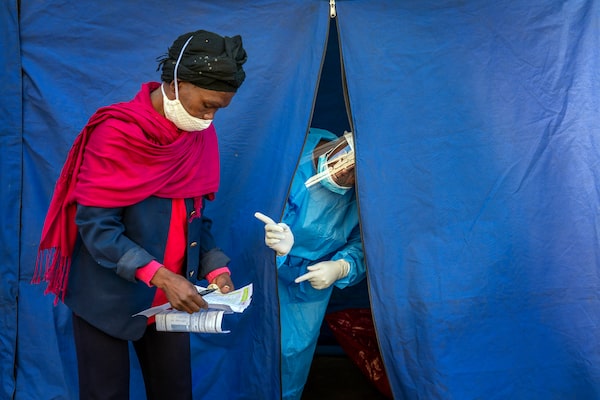
Health officials check the listings of people who are to be tested for COVID-19, as well as HIV and Tuberculosis, in downtown Johannesburg, South Africa, on April 30, 2020. Johnson & Johnson has agreed to not enforce its patents on Tuberculosis medication in 143 countries, including South Africa.Jerome Delay/The Associated Press
A leading U.S. drug manufacturer, under heavy pressure from health activists and competition regulators, has agreed to allow cheap generic versions of its life-saving tuberculosis medicine in developing-world countries.
Johnson & Johnson announced on the weekend that it will not enforce its patents for the TB drug, bedaquiline, in 134 low-income and middle-income countries. Health groups hailed the decision as a major victory for global equity and fairness in drug pricing, an increasingly controversial issue since the COVID-19 pandemic.
Clinical trials, including many in South Africa’s impoverished townships, found that bedaquiline had dramatic success in treating multidrug-resistant TB, a common version of tuberculosis that doesn’t respond to traditional drugs.
Health activists have charged for years that the big multinational manufacturers were erecting barriers to treatment for diseases such as TB that largely affect poorer countries. TB kills more than a million people worldwide every year and is the deadliest disease in countries such as South Africa.
Last month, South Africa’s Competition Commission announced it was launching an investigation into J&J on allegations that it was imposing excessive prices and unfair patent extensions in South Africa.
High price of tuberculosis drug triggers political, legal fight in South Africa
In a statement, J&J said its new decision on patents is “intended to assure current and future generic manufacturers” that they can sell their versions without any concern about patent enforcement as long as they are good quality and sold only in the 134 countries.
“This addresses any misperception that access to our medicine is limited or restricted,” the company said.
The most significant barrier to TB treatment is a lack of diagnosis, the company said. Of the 450,000 people who develop multidrug-resistant TB every year, nearly two-thirds are undiagnosed, it said.
The battle over bedaquiline is the latest in a global campaign to expand access to drugs, vaccines and tests, which are often unaffordable in lower-income countries. Health activists waged a court battle this year to force South Africa to disclose its previously secret contracts with COVID-19 vaccine manufacturers. The contracts, when finally released, showed that the producers were charging higher prices to South Africa than they were to wealthier countries.
The activists won another victory last month when two companies, Cepheid and Danaher Corp., agreed to a 20-per-cent reduction in their tuberculosis testing technology, after a lengthy pressure campaign by the health groups.
Earlier this year, officials in India put further pressure on J&J by rejecting the company’s attempt to extend its bedaquiline patent there. The company then agreed to a 55-per-cent reduction in the price of the drug in a licensing agreement in dozens of lower-income countries – but it did not agree to a price reduction in other countries, including South Africa, until its announcement on the weekend.
Fatima Hassan, director of South Africa’s Health Justice Initiative, said the J&J decision on patents was long overdue. “This is an important day for TB activism,” she said in a statement on Saturday.
Despite the announcement, the Competition Commission should continue its investigation into J&J’s historical conduct in South Africa, which caused high prices and denial of access to bedaquiline for thousands of patients with multidrug-resistant tuberculosis, Ms. Hassan said.
Christophe Perrin, a TB campaigner at Médecins Sans Frontières (Doctors Without Borders), said the J&J decision was groundbreaking. “We need all newer TB innovations to be as affordable as absolutely possible, so governments can scale up prevention, testing and treatment to beat back this curable disease,” Mr. Perrin said in a statement. “People with TB literally cannot afford to wait any longer.”
The investigation by the South African Competition Commission had “undoubtedly added significant pressure on J&J,” he said.
The next step, he said, should be for Japanese pharmaceutical company Otsuka to refrain from enforcing patents in lower-income countries for another key TB drug, delamanid, which is often used in combination with bedaquiline.
 Geoffrey York
Geoffrey York